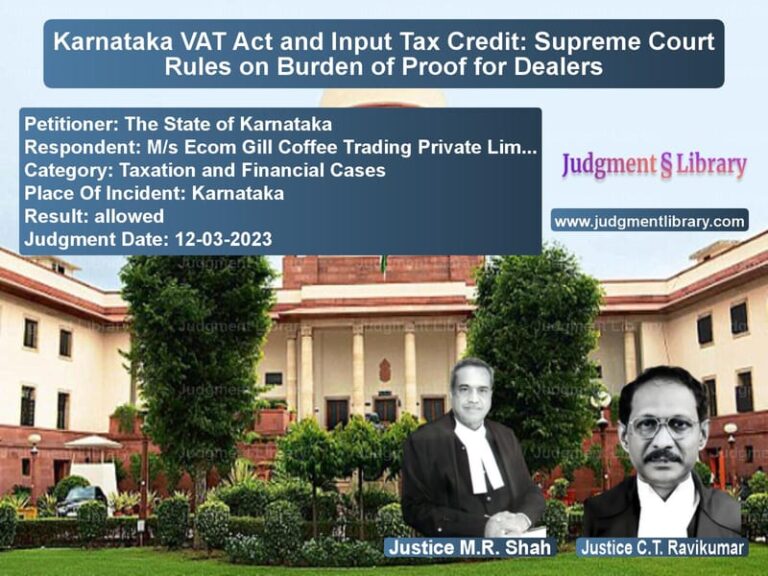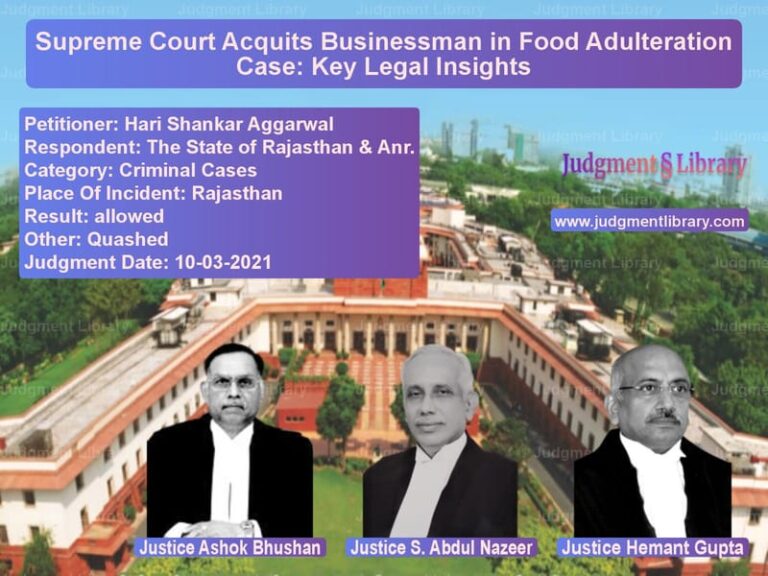Supreme Court Grants Pension Benefits to Fast Track Court Judges After Regularization
The case of Mahesh Chandra Verma v. State of Jharkhand & Others revolves around whether judicial officers appointed as Fast Track Court Judges (FTC Judges) are entitled to have their years of service counted for pensionary and other retirement benefits once they are absorbed into the regular judicial service. The Supreme Court ruled in favor of the appellants, affirming their right to pension benefits.
Background of the Case
The Jharkhand High Court issued an advertisement on May 23, 2001, to fill vacancies for Additional District Judges in the Jharkhand Superior Judicial Service. Candidates, including the appellants, participated in the selection process. After the selection process:
- A final list of 27 candidates was prepared, but some candidates could not be accommodated in the available vacancies.
- The 11th Finance Commission allocated funds for the creation of Fast Track Courts (FTCs) across India to address the backlog of cases.
- Following this, Jharkhand set up 80 FTCs, recruiting judicial officers on a contractual basis.
- The remaining judicial candidates who were not selected for permanent service were appointed as FTC Judges on a temporary basis.
After years of service, the appellants sought regularization into the judicial service. However, once regularized, they were treated as fresh recruits without crediting their FTC service towards pension and retirement benefits.
Legal Issues
The key legal question before the Supreme Court was:
- Whether the service rendered as Fast Track Court Judges should be counted towards pension and other retirement benefits after their regularization.
Arguments by the Appellants
The appellants argued that:
- They were selected through a proper recruitment process and were part of the merit list for judicial appointments.
- Their appointment as FTC Judges was not voluntary but a result of insufficient vacancies in the regular cadre.
- They served in the judicial system for nearly a decade, delivering justice and clearing case backlogs.
- Denying them pensionary benefits would be arbitrary and unfair, as they were absorbed into regular judicial service due to their performance.
Arguments by the Respondents
The State of Jharkhand and the High Court countered:
- Fast Track Court appointments were temporary and not part of the regular judicial cadre.
- When regularized, these judicial officers had to clear a qualifying examination, justifying their treatment as fresh recruits.
- There was no constitutional or statutory provision mandating that FTC service be counted for pension benefits.
Supreme Court’s Observations
The Supreme Court analyzed the case and ruled in favor of the appellants. Key observations included:
1. Fast Track Court Judges Were Appointed Due to Systemic Constraints
The Court acknowledged that FTCs were created due to a shortage of judges and backlog of cases. It stated:
“The appellants were not appointed at their own will but were placed as FTC Judges due to an administrative need. They discharged judicial duties like regular judges and should not be penalized for systemic inadequacies.”
2. No Prohibition Against Counting FTC Service
The Court found that neither the Constitution nor existing service rules explicitly barred FTC service from being counted. It noted:
“There is no express legal provision that precludes the counting of FTC service for pension purposes. Therefore, denying such benefits is unjustified.”
3. Judicial Work Performed Should Be Acknowledged
The Court highlighted that FTC Judges had adjudicated cases and contributed significantly to the judicial system. It remarked:
“It would be unfair to ignore the valuable contribution made by these judicial officers who worked in Fast Track Courts for years.”
4. Benefit of Pension Should Be Given
The Court found it unjust to deny pension benefits after years of judicial service. It ruled:
“The period of service rendered as FTC Judges shall be counted for pension and retirement benefits, ensuring justice and fairness to the appellants.”
Final Judgment
The Supreme Court allowed the appeal and directed that:
- The service rendered by the appellants as Fast Track Court Judges should be counted for pension and other retirement benefits.
- The appellants should not be treated as fresh recruits after regularization.
- The State Government and the High Court must implement the order within a specified period.
Conclusion
The Supreme Court’s ruling in this case establishes an important precedent regarding the rights of judicial officers. It ensures that judicial officers who serve in temporary capacities are not unfairly deprived of their due benefits after regularization. The decision strengthens the principle that individuals who perform judicial duties must receive fair treatment under service rules.
Petitioner Name: Mahesh Chandra Verma.Respondent Name: State of Jharkhand & Others.Judgment By: Justice Sanjay Kishan Kaul.Place Of Incident: Jharkhand.Judgment Date: 11-05-2018.
Don’t miss out on the full details! Download the complete judgment in PDF format below and gain valuable insights instantly!
Download Judgment: Mahesh Chandra Verma vs State of Jharkhand & Supreme Court of India Judgment Dated 11-05-2018.pdf
Direct Downlaod Judgment: Direct downlaod this Judgment
See all petitions in Pension and Gratuity
See all petitions in Public Sector Employees
See all petitions in Judgment by Sanjay Kishan Kaul
See all petitions in allowed
See all petitions in Modified
See all petitions in supreme court of India judgments May 2018
See all petitions in 2018 judgments
See all posts in Service Matters Category
See all allowed petitions in Service Matters Category
See all Dismissed petitions in Service Matters Category
See all partially allowed petitions in Service Matters Category







